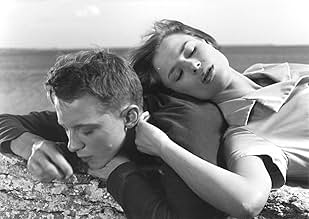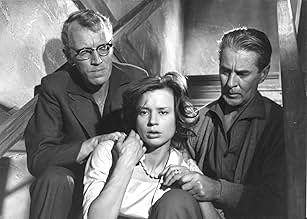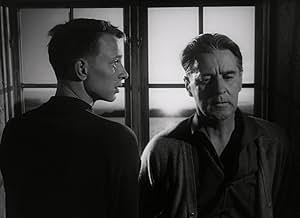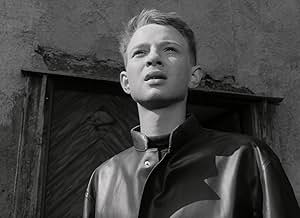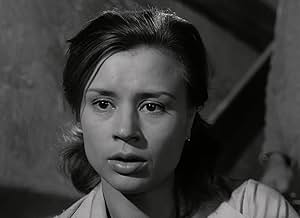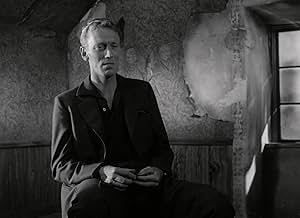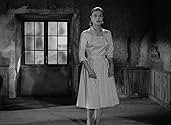IMDb-BEWERTUNG
7,9/10
28.500
IHRE BEWERTUNG
Kürzlich wurde Karin aus einer psychiatrischen Klinik entlassen; nun kehrt sie auf eine Insel in das Haus ihrer entfremdeten Familie zurück, wo sie erneut der Wirklichkeit entflieht, als sie... Alles lesenKürzlich wurde Karin aus einer psychiatrischen Klinik entlassen; nun kehrt sie auf eine Insel in das Haus ihrer entfremdeten Familie zurück, wo sie erneut der Wirklichkeit entflieht, als sie glaubt, Besuche von Gott zu erhalten.Kürzlich wurde Karin aus einer psychiatrischen Klinik entlassen; nun kehrt sie auf eine Insel in das Haus ihrer entfremdeten Familie zurück, wo sie erneut der Wirklichkeit entflieht, als sie glaubt, Besuche von Gott zu erhalten.
- Regie
- Drehbuch
- Hauptbesetzung
- 1 Oscar gewonnen
- 3 Gewinne & 5 Nominierungen insgesamt
Empfohlene Bewertungen
this is one of bergman's most serious and devastating, sometimes horribly depressing and (it's only flaw) a little too heavy handed for even the toughest and healthiest viewers. it is fascinating to watch bergman come to terms with the absence of god and man's tragic isolation in an indifferent universe through the art he uses like no one else could or does, the art of film. karin is a mentally disordered young woman, intensely loved by her family and well cared for but nonetheless subject to bouts of extreme madness and delusions of divinity that are so convincing and well performed as to be hard to watch (particularly the scene where she is convinced that a deity disguised as a spider is going to crawl out of a closet). although it ends on a semi hopeful note, the film's atmosphere is largely one of sterility, emotional dryness, impoverishment and despair. karin lives on an isolated island just as we inhabit a vast, incomprehensible universe that is essentially little but a doomed speck of dust in a monstrous cosmos that does not care. i think there can be little debate as to the correct interpretation of this movie, which is the utter void at the center of false human beliefs and illusions of happiness or omnipotence. order is a lie and religious belief is founded on deliberate self deception. a masterpiece of the most passionate artistry and integrity.
10jhclues
A character study set on a secluded island off the coast of Sweden, `Through A Glass, Darkly' is Ingmar Bergman's pensive chronicle of a young woman's descent into the maelstrom of schizophrenia. The story centers on Karin (Harriet Andersson), who has reached a pivotal juncture in her life; having just been released from a mental hospital, she must now face the uncertainties inherent in the nature of her illness. It is a crucial period in her life; she occupies a middle ground between two worlds, and the question now is, will she ultimately emerge in the light, or succumb to the darkness of the voices that beckon her from within. Through Bergman's eyes we observe the effects of her situation on the three people closest to her, her husband, Martin (Max von Sydow), her father, David (Gunnar Bjornstrand) and her brother, Minus (Lars Passgard). The movie explores their relationships to Karin (and to one another), and how differently each one them strives to cope with and understand her elusive affliction. An absorbing, evocative and sometimes tense drama, the film is impeccably delivered by Bergman, and the performances are all exemplary, especially Harriet Andersson, who brings the tortured soul of Karin to life with nuance and a depth and grasp of the character that is remarkable. Von Sydow is also perfect as the troubled Martin, and aptly conveys the quandary of his situation, which he approaches with a reserved, committed gentleness. Bjornstrand maintains a stoic presence throughout as the novelist/father attempting to resolve an inner conflict borne of guilt and doubtful motives, and Passgard gives a notable performance, as well; his angst and confusion are deeply felt and well played. The first of Bergman's 'Faith' trilogy (followed by `Winter Light' and `The Silence'), `Through A Glass, Darkly' is one of his finest works, an intricate exploration of the fragility of the human psyche and the complexities of life. An Oscar winner for Best Foreign Film of 1961, it firmly establishes Bergman as one of Cinema's greatest directors. It is an emotional and engrossing film that should not be missed. I rate this one 10/10.
Through a Glass Darkly marks one of the first collaborations between Bergman and his long time cinematographer Sven Nykvist (who passed away this last September). Nykvist shot films as varied as Lasse Hallestroms 'What's Eating Gilbert Grape' to Woody Allen's 'Crimes and Misdemeanors.' Nykvist's touch is present throughout the film, a style that begins to become a part of Bergman's signature mise-en-scene.
Bergman's screenplay is transitional because of it's scarcity of saturation. Using a cast of only four and only one location, the family's country home on an island off the coast of Sweden. Karin (Harriet Andersson) is slowly going mad, her family (fiancée, father and brother) are trying to understand her and not send her away, trying to let her know that things may be alright as she descends into hysteria, talking to walls, waiting for god to come out of the closet.
The film is quite simply a masterpiece. A portrayal of descent into madness and the effect on others that feels more grounded in reality than even the best of films on madness (see: Shock Corridor Samuel Fuller, One Flew Over the Cuckoo's Nest Milos Foreman, or The Three Burials of Melquiades Estrada Tommy Lee Jones) Nykvist's mostly static camera gives the film a brooding sense of anticipation, lingering motionlessly, allowing the actors to move freely into deep frames, marginalizing themselves as they move about the large empty frame. The camera even goes so far as to linger a little too long at times, waiting long after the actors have exited the frame, making sure that the audience is aware that the hollowness, these spaces they live and think in exist without them, these voids the audience is watching never go away.
These sentiments are echoed by the well penned script. The father's regret over the madness of his deceased wife, the husbands jealousy, his inability to act, the nearly sexual love the brother feels for Karin, his isolation and inability to get over his immaturity. It's a delicately woven, exquisitely beautiful film on the landscapes of the mind and the solitude of life and the search for god. A good introduction to the psychological drama of Bergman for anyone unfamiliar with one cinema's masters.
Bergman's screenplay is transitional because of it's scarcity of saturation. Using a cast of only four and only one location, the family's country home on an island off the coast of Sweden. Karin (Harriet Andersson) is slowly going mad, her family (fiancée, father and brother) are trying to understand her and not send her away, trying to let her know that things may be alright as she descends into hysteria, talking to walls, waiting for god to come out of the closet.
The film is quite simply a masterpiece. A portrayal of descent into madness and the effect on others that feels more grounded in reality than even the best of films on madness (see: Shock Corridor Samuel Fuller, One Flew Over the Cuckoo's Nest Milos Foreman, or The Three Burials of Melquiades Estrada Tommy Lee Jones) Nykvist's mostly static camera gives the film a brooding sense of anticipation, lingering motionlessly, allowing the actors to move freely into deep frames, marginalizing themselves as they move about the large empty frame. The camera even goes so far as to linger a little too long at times, waiting long after the actors have exited the frame, making sure that the audience is aware that the hollowness, these spaces they live and think in exist without them, these voids the audience is watching never go away.
These sentiments are echoed by the well penned script. The father's regret over the madness of his deceased wife, the husbands jealousy, his inability to act, the nearly sexual love the brother feels for Karin, his isolation and inability to get over his immaturity. It's a delicately woven, exquisitely beautiful film on the landscapes of the mind and the solitude of life and the search for god. A good introduction to the psychological drama of Bergman for anyone unfamiliar with one cinema's masters.
Bergman's haunting, somber feature "Through a Glass Darkly" is the kind of distinctive, sometimes uncomfortable, and carefully-crafted movie that can stick in the minds of its viewers long afterwards. Its combination of images, scenery, characters, and themes provides plenty of things to think about, more than could be assimilated in any one viewing. Bergman is one of the very few film-makers who had the knack for making this kind of feature coherent and memorable at the same time.
The story could hardly be more efficient. The very small cast and the tight scenario place a premium on the writing, acting, and photography. The characters have a good balance of similarities and differences that makes for a wide range of possibilities, and the story makes good use of them. The seaside setting is used nicely, with the beautiful scenery and thematic images both complementing the story. The old shipwreck is skillfully worked into a psychologically harrowing sequence.
The setting is combined with the family relationships, biblical allusions, philosophical questions, and much more, to raise a wide range of interesting and thoughtful questions. Although "Through a Glass Darkly" does not feature the extensive use of unusual imagery found in Bergman features like "The Seventh Seal" or "Persona", or the dream sequence from "Wild Strawberries", in its own way it is also effective.
The story could hardly be more efficient. The very small cast and the tight scenario place a premium on the writing, acting, and photography. The characters have a good balance of similarities and differences that makes for a wide range of possibilities, and the story makes good use of them. The seaside setting is used nicely, with the beautiful scenery and thematic images both complementing the story. The old shipwreck is skillfully worked into a psychologically harrowing sequence.
The setting is combined with the family relationships, biblical allusions, philosophical questions, and much more, to raise a wide range of interesting and thoughtful questions. Although "Through a Glass Darkly" does not feature the extensive use of unusual imagery found in Bergman features like "The Seventh Seal" or "Persona", or the dream sequence from "Wild Strawberries", in its own way it is also effective.
Between 1957-1963, Ingmar Bergman directed seven films. In my mind, there has never been such an amazingly creative period for a director as the six years between Wild Strawberries and The Silence. Through a Glass Darkly stands out to me as not only the masterpiece of this era, but of Bergman's entire career. This film has such a distinct atmosphere, which conveys not only isolation and melancholy, but also dark, austere beauty. Every little piece of this film fits together like a glorious completed puzzle. The Bach playing over the opening credits. The cinematography, with long, meditative shots in glowing black and white. The performances turned in by Harriet Andersson, Gunner Bjornstrand, and Bergman regular Max von Sydow. Overall, I sense that Bergman's vision is so obviously being displayed on the screen, as if his soul is being laid bare. As a singular piece of art, it is just staggering to behold. I think that everyone has albums or films that they connect with certain periods in their life, that transcend the mundane and just touch you in a profound way. Through a Glass Darkly is one for me. A must see.
Wusstest du schon
- WissenswertesThe first Ingmar Bergman film to be made on the island of Fårö. Bergman would later buy a home on the island.
- PatzerAs Minus paints the chair, the amount of paint on the chair changes between shots.
- Crazy CreditsThere are no end credits. After Minus (Lars Passgård) says the final line, the film fades to black and ends. The entire cast and crew were credited at the start, and there isn't even a "Fin" or "Ende".
- VerbindungenFeatured in Reel Radicals: The Sixties Revolution in Film (2002)
- SoundtracksSarabande from Suite No. 2 in D minor for Violoncello
Written by Johann Sebastian Bach
Performed by Blondal Bengston.
Top-Auswahl
Melde dich zum Bewerten an und greife auf die Watchlist für personalisierte Empfehlungen zu.
- How long is Through a Glass Darkly?Powered by Alexa
Details
Box Office
- Weltweiter Bruttoertrag
- 8.939 $
- Laufzeit1 Stunde 30 Minuten
- Farbe
- Sound-Mix
- Seitenverhältnis
- 1.37 : 1
Zu dieser Seite beitragen
Bearbeitung vorschlagen oder fehlenden Inhalt hinzufügen

Oberste Lücke
By what name was Wie in einem Spiegel (1961) officially released in India in English?
Antwort

